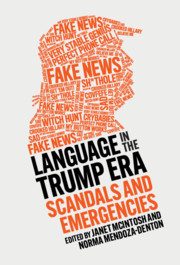28 results
Characterisation of age and polarity at onset in bipolar disorder
-
- Journal:
- The British Journal of Psychiatry / Volume 219 / Issue 6 / December 2021
- Published online by Cambridge University Press:
- 25 August 2021, pp. 659-669
- Print publication:
- December 2021
-
- Article
-
- You have access
- Open access
- HTML
- Export citation
‘Because it's easier to kill that way’: Dehumanizing epithets, militarized subjectivity, and American necropolitics
-
- Journal:
- Language in Society / Volume 50 / Issue 4 / September 2021
- Published online by Cambridge University Press:
- 12 August 2021, pp. 583-603
- Print publication:
- September 2021
-
- Article
- Export citation
9 - Part III Introduction: Collusion: On Playing Along with the President
- from Part III - The Interactive Making of the Trumpian World
-
-
- Book:
- Language in the Trump Era
- Published online:
- 18 September 2020
- Print publication:
- 03 September 2020, pp 151-157
-
- Chapter
- Export citation

Language in the Trump Era
- Scandals and Emergencies
-
- Published online:
- 18 September 2020
- Print publication:
- 03 September 2020
Introduction: The Trump Era as a Linguistic Emergency
-
-
- Book:
- Language in the Trump Era
- Published online:
- 18 September 2020
- Print publication:
- 03 September 2020, pp 1-44
-
- Chapter
- Export citation
Tables
-
- Book:
- Language in the Trump Era
- Published online:
- 18 September 2020
- Print publication:
- 03 September 2020, pp xi-xi
-
- Chapter
- Export citation
Note on Transcription Conventions
-
- Book:
- Language in the Trump Era
- Published online:
- 18 September 2020
- Print publication:
- 03 September 2020, pp xviii-xviii
-
- Chapter
- Export citation
Part III - The Interactive Making of the Trumpian World
-
- Book:
- Language in the Trump Era
- Published online:
- 18 September 2020
- Print publication:
- 03 September 2020, pp 149-214
-
- Chapter
- Export citation
Contributors
-
- Book:
- Language in the Trump Era
- Published online:
- 18 September 2020
- Print publication:
- 03 September 2020, pp xii-xv
-
- Chapter
- Export citation
Figures
-
- Book:
- Language in the Trump Era
- Published online:
- 18 September 2020
- Print publication:
- 03 September 2020, pp x-x
-
- Chapter
- Export citation
15 - Part IV Introduction: Language and Trump’s White Nationalist Strongman Politics
- from Part IV - Language, White Nationalism, and International Responses to Trump
-
-
- Book:
- Language in the Trump Era
- Published online:
- 18 September 2020
- Print publication:
- 03 September 2020, pp 217-225
-
- Chapter
- Export citation
Part II - Performance and Falsehood
-
- Book:
- Language in the Trump Era
- Published online:
- 18 September 2020
- Print publication:
- 03 September 2020, pp 89-148
-
- Chapter
- Export citation
Copyright page
-
- Book:
- Language in the Trump Era
- Published online:
- 18 September 2020
- Print publication:
- 03 September 2020, pp iv-iv
-
- Chapter
- Export citation
Index
-
- Book:
- Language in the Trump Era
- Published online:
- 18 September 2020
- Print publication:
- 03 September 2020, pp 291-302
-
- Chapter
- Export citation
Part IV - Language, White Nationalism, and International Responses to Trump
-
- Book:
- Language in the Trump Era
- Published online:
- 18 September 2020
- Print publication:
- 03 September 2020, pp 215-290
-
- Chapter
- Export citation
4 - Crybabies and Snowflakes
- from Part I - Dividing the American Public
-
-
- Book:
- Language in the Trump Era
- Published online:
- 18 September 2020
- Print publication:
- 03 September 2020, pp 74-88
-
- Chapter
- Export citation
Contents
-
- Book:
- Language in the Trump Era
- Published online:
- 18 September 2020
- Print publication:
- 03 September 2020, pp vii-ix
-
- Chapter
- Export citation
Dedication
-
- Book:
- Language in the Trump Era
- Published online:
- 18 September 2020
- Print publication:
- 03 September 2020, pp v-vi
-
- Chapter
- Export citation
Acknowledgments
-
- Book:
- Language in the Trump Era
- Published online:
- 18 September 2020
- Print publication:
- 03 September 2020, pp xvi-xvii
-
- Chapter
- Export citation
Part I - Dividing the American Public
-
- Book:
- Language in the Trump Era
- Published online:
- 18 September 2020
- Print publication:
- 03 September 2020, pp 45-88
-
- Chapter
- Export citation

